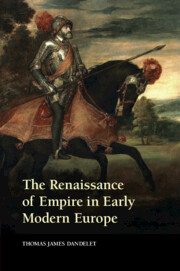Book contents
- Frontmatter
- Contents
- List of illustrations and maps
- Acknowledgments
- Introduction
- 1 The Rebirth of the Caesars
- 2 The Return of Caesar: The Hybrid Empire of Charles V, 1517 to 1556
- 3 The Spanish Empire, Apex of the Imperial Renaissance
- 4 The Renaissance of Empire in France
- 5 Britain as Late Renaissance Empire
- Conclusion
- Select Bibliography
- Index
- References
Conclusion
Published online by Cambridge University Press: 05 June 2014
- Frontmatter
- Contents
- List of illustrations and maps
- Acknowledgments
- Introduction
- 1 The Rebirth of the Caesars
- 2 The Return of Caesar: The Hybrid Empire of Charles V, 1517 to 1556
- 3 The Spanish Empire, Apex of the Imperial Renaissance
- 4 The Renaissance of Empire in France
- 5 Britain as Late Renaissance Empire
- Conclusion
- Select Bibliography
- Index
- References
Summary
In 1724, the premiere of George Frideric Handel’s new opera, Julius Caesar, was performed at the King’s Theatre in London under the patronage of King George I. Met with much praise, the performance presented Caesar in a heroic light as he successfully defeated Ptolemy and took control of Egypt. Many additional productions followed as Caesar remained popular. Opera was well suited for advancing his fame and for celebrating the history of the Roman Empire, and it was a telling sign that the premiere was performed in the capital of Europe’s rising empire, Great Britain. Gone was the ambiguous characterization of Shakespeare’s Caesar from a century earlier. In his operatic incarnation, Handel’s Caesar was the conquering hero of Clement Edmonds.
In addition to the opera stage, the urban stages of Europe’s cosmopolitan centers celebrated empire for the growing populations of London, Paris, Madrid, Lisbon, and Rome. Palaces and temples inspired by Vitruvian principles, large plazas with classicized equestrian monuments of their most illustrious monarchs, and broad streets punctuated with columns and fountains were the fruits of the triumphs of their armies and the treasure that they extracted from their new colonies. They were the most visible signs of the Imperial Renaissance and the tangible fulfillment of the dreams of reviving ancient Rome. These cities left no doubt that Europe had been immutably transformed by the cultural and political movement set in motion by Italian humanists and princes almost four centuries earlier.
- Type
- Chapter
- Information
- The Renaissance of Empire in Early Modern Europe , pp. 282 - 286Publisher: Cambridge University PressPrint publication year: 2014



